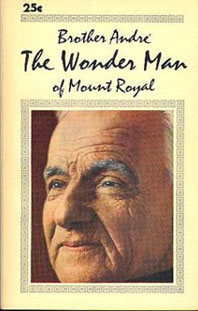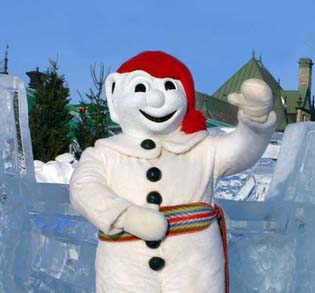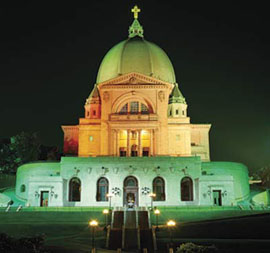Did Wonder Man of Mount Royal work miracles? .. Merry Christmas Brother André anyway 2009 ..
Dec 22nd, 2009 | By Dominic Berry | Category: In Brief
Biography of Brother André by Henri-Paul Bergeron, purchased at St. Joseph’s Oratory for 25c in the early 1970s. Now available new on amazon.com for $7.95.
One pristine winter in the early 1970s I took a trip with several friends to the annual carnival in Quebec City. While passing through Montreal we paid a poignant chance visit to St. Joseph’s Oratory, at 3800 Chemin Queen-Mary on Mount Royal.
This was my first encounter with Brother André (1845—1937) – who inspired the Oratory’s first modest building in 1904. At the much vaster basilica of today I bought a 192-page paperback called The Wonder Man of Mount Royal. And I read it in the car, sometimes even aloud I think, on the drive from Montreal to Quebec City.
All this rushed back to me when I heard this past weekend that: “In Rome this morning [December 19, 2009], the Holy Father, Benedict XVI held a private audience with … the Congregation for the Causes of Saints … the Holy Father authorized the Congregation to issue a decree concerning a miracle attributed to the intercession of Blessed Brother André, CSC, founder of Saint Joseph’s Oratory of Mount Royal.”
I am not myself at all religious – Buddhist, Christian, Hindu, Jew, Muslim, Zoroastrian, or otherwise. But inside the copy of The Wonder Man of Mount Royal I still have is a newspaper clipping, dated June 13, 1978: “Pope Paul yesterday approved a decree by which Montreal-born Brother André was declared venerable, the first step towards his … becoming Canada’s first native-born saint.”
What has just happened this past weekend, more than 31 years later, “‘has revitalized our expectations to see Brother André among the saints of the Catholic Church,’ Father Claude Grou, the [current] rector of St. Joseph’s Oratory, said in a statement.” And if anybody actually deserves to be declared a saint, it seems to me, it probably is Brother André.
Apparently, you have to perform at least one miracle to qualify as a saint in the Catholic Church. This seems to be what the hierarchy has now decided about Brother André. At the height of his career in the earlier 20th century, it was his reputation for miraculous cures of all manner of human ailments that made him famous. At St. Joseph’s Oratory today there “is a wall covered with thousands of crutches from those who came to the basilica and were healed.”
Nowadays far fewer people buy into this kind of story, of course. Yet even in his own time Brother André never made big claims himself. For all his clerical life he was a lowly religious worker. He “said … ‘If there was anyone more ignorant than I am, God would have chosen him … Do not seek to have these trials lifted from you …ask for the grace to bear them well.’ Generally he encouraged people to see a doctor … ‘God,’ he said, ‘is love and he loves us … One of his friends said: ‘I never brought a sick person to Brother André without that person returning home enriched. Some were cured. Others died … but Brother André had consoled them.’” When he died himself in 1937 “more than a million people attended his wake and burial” in Montreal.

Bonhomme Carnaval, the Quebec Winter Carnival's ambassador, in his ice palace at Quebec City. Photo courtesy Carnaval de Québec.
There are sides to Brother André I find appalling. (And something about his continuing spirit at the Oratory exudes a chilling austerity to me.) His reputation today is not at all what it used to be. But if there is any higher virtue to the holiday season now upon us, it must have something to do with “God is love and he loves us.”
One other thing I remember vividly about my Quebec carnival trip in the early 1970s is a conversation with a particular friend in the car. He was a (then still quite young and aggressively scientific) medical doctor. I asked him how he interpreted the most striking miraculous claims about Brother André, who had somehow moved us all. He thought for a bit, and then just said with a shrug (and a smile): “Maybe they were miracles?”


